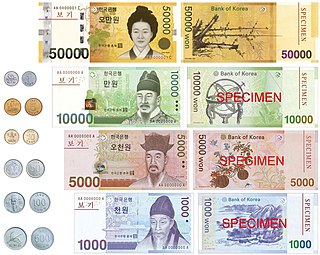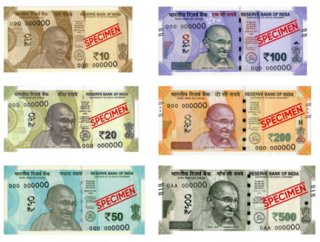
The krona is the currency of the Kingdom of Sweden. It is one of the currencies of the European Union. Both the ISO code "SEK" and currency sign "kr" are in common use for the krona; the former precedes or follows the value, the latter usually follows it but, especially in the past, it sometimes preceded the value. In English, the currency is sometimes referred to as the Swedish crown, as krona means "crown" in Swedish. The Swedish krona was the ninth-most traded currency in the world by value in April 2016.

The Canadian dollar is the currency of Canada. It is abbreviated with the dollar sign $. There is no standard disambiguating form, but the abbreviations Can$, CA$ and C$ are frequently used for distinction from other dollar-denominated currencies. It is divided into 100 cents (¢).

The peseta was the currency of Spain between 1868 and 2002. Along with the French franc, it was also a de facto currency used in Andorra.

The New Zealand dollar is the official currency and legal tender of New Zealand, the Cook Islands, Niue, the Ross Dependency, Tokelau, and a British territory, the Pitcairn Islands. Within New Zealand, it is almost always abbreviated with the dollar sign ($). The abbreviations "$NZ" or "NZ$" are used when necessary to distinguish it from other dollar-denominated currencies.

The ruble or rouble is the currency of the Russian Federation. The ruble is subdivided into 100 kopecks. It is used in Russia as well as in the parts of Ukraine under Russian military occupation and in Russian-occupied parts of Georgia.

Piggy bank is the traditional name of a coin container normally used by children. The piggy bank is known to collectors as a "still bank" as opposed to the "mechanical banks" popular in the early 20th century. These items are also often used by companies for promotional purposes, and many financial service companies use piggy banks as logos for their savings products.

Matthew Boulton was an English businessman, inventor, mechanical engineer, and silversmith. He was a business partner of the Scottish engineer James Watt. In the final quarter of the 18th century, the partnership installed hundreds of Boulton & Watt steam engines, which were a great advance on the state of the art, making possible the mechanisation of factories and mills. Boulton applied modern techniques to the minting of coins, striking millions of pieces for Britain and other countries, and supplying the Royal Mint with up-to-date equipment.

Legal tender is a form of money that courts of law are required to recognize as satisfactory payment for any monetary debt. Each jurisdiction determines what is legal tender, but essentially it is anything which when offered ("tendered") in payment of a debt extinguishes the debt. There is no obligation on the creditor to accept the tendered payment, but the act of tendering the payment in legal tender discharges the debt.

Sterling is the currency of the United Kingdom and nine of its associated territories. The pound is the main unit of sterling, and the word pound is also used to refer to the British currency generally, often qualified in international contexts as the British pound or the pound sterling.

The South Korean won is the official currency of South Korea. A single won is divided into 100 jeon, the monetary subunit. The jeon is no longer used for everyday transactions, and it appears only in foreign exchange rates. The currency is issued by the Bank of Korea, based in the capital city of Seoul.

The Indian rupee is the official currency in the Republic of India. The rupee is subdivided into 100 paise. The issuance of the currency is controlled by the Reserve Bank of India. The Reserve Bank manages currency in India and derives its role in currency management based on the Reserve Bank of India Act, 1934.

The Romanian leu is the currency of Romania. It is subdivided into 100 bani, a word that also means "money" in the Romanian language.

The birr is the primary unit of currency in Ethiopia. It is subdivided into 100 santims.
Exidy, Inc. was an American developer and manufacturer of coin-operated electro-mechanical and video games which operated from 1973 to 1999. They manufactured many notable titles including Death Race (1976), Circus (1978), Star Fire (1978), Venture (1981), Mouse Trap (1981), Crossbow (1983), and Chiller (1986). They were also the creators of the Exidy Sorcerer (1978) home computer platform.

Melitopol is a city and municipality in Zaporizhzhia Oblast, southeastern Ukraine. It is situated on the Molochna River, which flows through the eastern edge of the city into the Molochnyi Lyman estuary. Melitopol is the second-largest city in the oblast after Zaporizhzhia and serves as the administrative centre of Melitopol Raion. As of January 2022, Melitopol's population was estimated to be 148,851.
Carson K. Miller is an American academic who is the President Emeritus and founding President of Washington State Community College, a comprehensive state college serving southeast Ohio and northern West Virginia. He served as president from October 1, 1985, through his retirement on June 30, 2002.

Money is any item or verifiable record that is generally accepted as payment for goods and services and repayment of debts, such as taxes, in a particular country or socio-economic context. The primary functions which distinguish money are: medium of exchange, a unit of account, a store of value and sometimes, a standard of deferred payment.

The United States dollar is the official currency of the United States and several other countries. The Coinage Act of 1792 introduced the U.S. dollar at par with the Spanish silver dollar, divided it into 100 cents, and authorized the minting of coins denominated in dollars and cents. U.S. banknotes are issued in the form of Federal Reserve Notes, popularly called greenbacks due to their predominantly green color.
Electro-mechanical games are types of arcade games that operate on a combination of some electronic circuitry and mechanical actions from the player to move items contained within the game's cabinet. Some of these were early light gun games using light-sensitive sensors on targets to register hits, while others were simulation games such as driving games, combat flight simulators and sports games. EM games were popular in amusement arcades from the late 1940s up until the 1970s, serving as alternatives to pinball machines, which had been stigmatized as games of chance during that period. EM games lost popularity in the 1970s, as arcade video games had emerged to replace them in addition to newer pinball machines designed as games of skill.

An arcade game or coin-op game is a coin-operated entertainment machine typically installed in public businesses such as restaurants, bars and amusement arcades. Most arcade games are presented as primarily games of skill and include arcade video games, pinball machines, electro-mechanical games, redemption games or merchandisers.

















